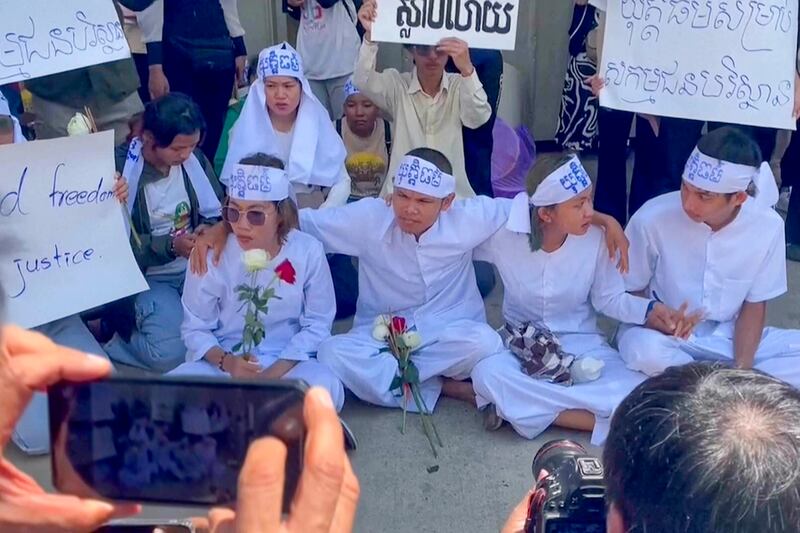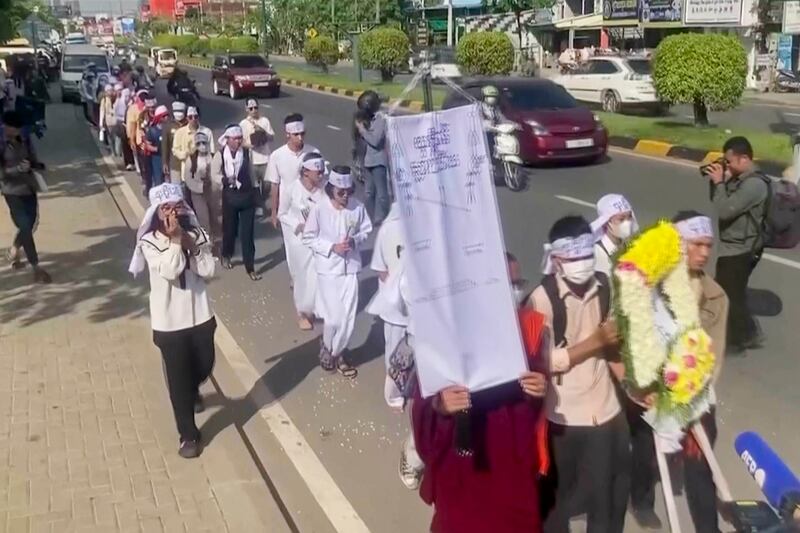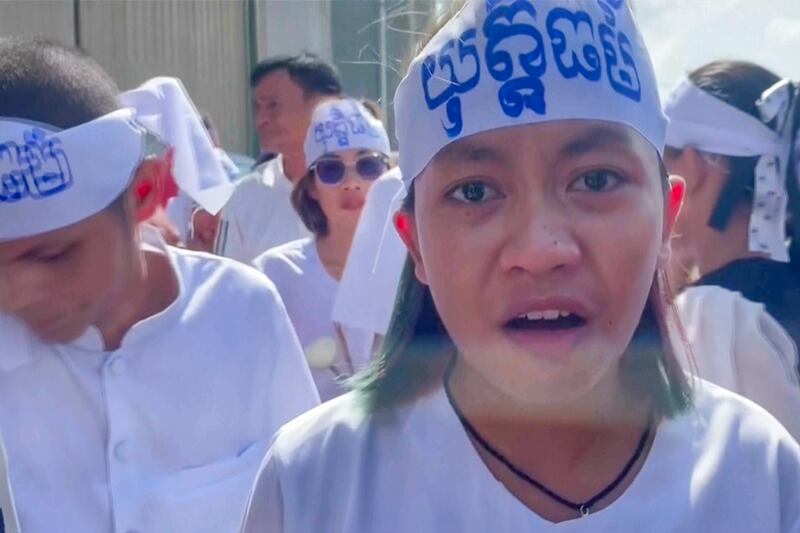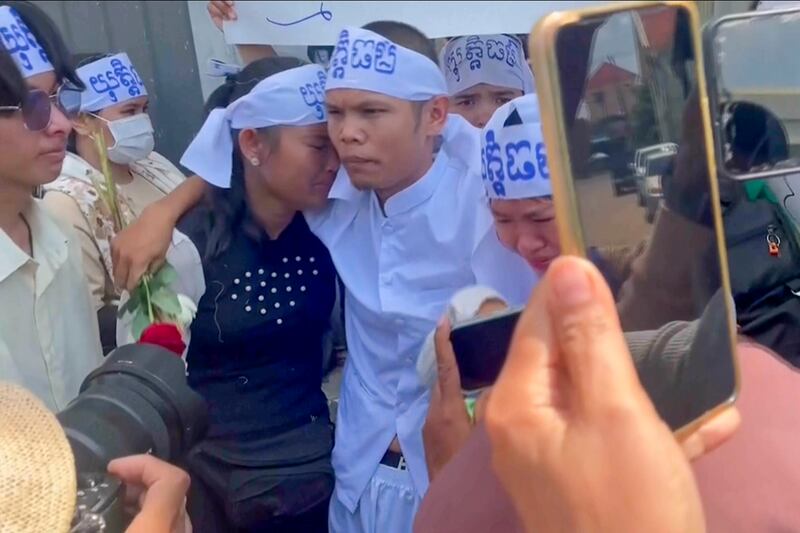Prison officials have stopped family members from visiting environmental activists who were convicted earlier this week in a case that more than 50 Cambodian NGOs called a “mockery of justice” and “a national shame.”
Five activists were taken into custody by police on Tuesday just after a Phnom Penh Municipal Court judge sentenced them to between six and eight years in prison. They were immediately transported to different prisons – some of them in remote provinces.
The sister of one activist from the Mother Nature environmental group said she attempted a visit at the prison in northern Preah Vihear province on Thursday, but was turned away.
Officials there said a letter from the Phnom Penh Municipal Court was required, Long Soklin told Radio Free Asia. Prison officials also wouldn’t allow her to hand over a package with food and supplies, she said.
“They said there is food for sale inside, and that she can buy things in the prison,” Long Soklin said.

Long Soklin's sister, Long Kunthea, was one of a total of 10 activists convicted in the case, which stemmed from several instances of activism, including the 2021 filming of sewage draining into the Tonle Sap river in front of Phnom Penh's Royal Palace.
All 10 defendants were convicted on Tuesday of conspiring against the state. Three of the 10 were also convicted of insulting King Norodom Sihamoni.
Five of the 10 defendants are either in hiding or live outside of the country and were tried in absentia, including the Khmer-speaking founder of the Mother Nature group, Spanish environmentalist Alejandro Gonzalez-Davidson, who was deported from Cambodia in 2015.
‘Sustained attacks’ on civil society
The charges – first filed in 2021 – have been widely condemned as politically motivated. This week's conviction brought another round of criticism from the U.N. human rights office, the U.S. Embassy, Human Rights Watch and other international observers.
On Thursday, the Cambodian Center for Human Rights said in a statement that the charges were “trumped up” and showed that the government failed to understand that “jailing environmental and youth advocates only harms the country’s future.”
The statement was signed by 53 Cambodian environmental, human rights and trade organizations.

It noted that Mother Nature’s work since 2013 has included advocacy for the protection of forests in Kampot province’s Bokor Mountain, the prevention of plastic pollution of Battambang’s Sangkae river and the cancellation of land privatization at Kirirom National Park.
“The portrayal of these activities and peaceful work as a form of plotting, combined with the leveraging of the lese-majeste provision, is just another example of the sustained attacks faced by civil society groups and frontline activists,” the Cambodian NGOs said in the statement.
Additionally, sending the five activists to different prisons was “transparently aimed at breaking the spirits of the activists” and to place a burden on family members who must travel hundreds of kilometers to visit them, the statement said.
The wife of another imprisoned Mother Nature activist said she was also barred by prison authorities this week.
Pat Raksmey told RFA she traveled to Trapeang Phlong prison in eastern Tbong Khmum province to try to visit her husband, Thon Ratha. Prison officials demanded that she show a marriage certificate and the official family book, which local government officials use to record birth dates, gender and marriages.

“This really hurts the family mentality, and we have to spend time and money, so it makes it difficult for me to visit him,” she said. “He has been imprisoned unjustly and now the prison has prevented him from meeting his family.”
‘Psychological punishment’
The court’s decision to send the five activists to prisons outside of Phnom Penh was psychological punishment aimed at the activists and their relatives, as well as a violation of human rights, according to Am Sam Ath of human rights group Licadho.
However, the spokesman for the Ministry of Interior’s prisons department denied that friends and relatives were being harassed by prison officials. They weren’t allowed to visit the activists because they didn’t present the proper documents, Nuth Savna said.
A certificate from the court isn’t necessary for a prison visit, but family visitors do need to show an identity card, a marriage certificate from their local commune or their family book, he said.

Additionally, separating the five activists wasn’t a violation of international law, Ministry of Interior spokesman Touch Sokak said.
The court’s decision may have been based on the number of available cells at each of the prisons, many of which are overcrowded, he said. Court officials may have also considered the nature of the crimes or the specific character of the perpetrators.
“But if you want to be clear, you have to ask the court,” he told RFA. “I am just telling you about a general legal matter.”
Relatives and friends of two other imprisoned activists, Phuon Keoreaksmey and Yim Leanghy, were able to see them this week at their respective prisons – but with restrictions.
Social activist Nuth Thi told RFA that she was only able to visit with Phuon Keoreaksmey for less than 40 minutes at Pursat provincial prison.
The secretary general of the Coalition of Khmer Intellectual Students, Ream Srey Pich Ratana, said she visited Yim Leanghy at Kampong Speu provincial prison on Wednesday.
Yim Leanghy appeared to be in strong spirits, although he expressed worries about his pregnant wife and their children, according to Ream Srey Pich Ratana.
Translated by Yun Samean and Sum Sok Ry. Edited by Matt Reed.
